Posted: April 12, 2013
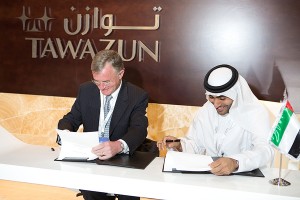
Pictured at the signing of a Memorandum of Understanding between Tawazun Safety Security & Disaster Management City L.L.C. and the National Maritime College of Ireland are Mr. Michael Delaney, Acting Head of College, NMCI and Mr. Khaleefa Al Hemairi, Acting General Manager, Tawazun.
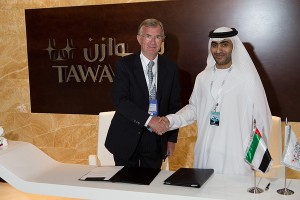
Sign Up to our Newsletter
Click Here
Posted: April 4, 2013
Tuesday 04/04/2013
“AN EXPLORATION COMPANY with rights to explore an area off the west coast of Co Kerry claims the field has shown the potential to hold hundreds of millions of barrels worth of oil.
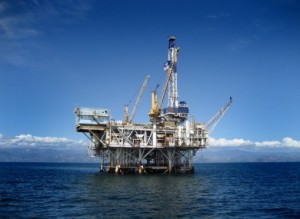
Petrel Resources says the site in ‘Quad 45′, about 100 kilometres to the west of Valentia Island, has “the capability to hold several hundred million barrels of in-place oil”.
The site was authorised for exploration in 2011, when 13 various sites in the Porcupine Basin off the west coast were offered for new ventures.
Petrel was offered two of those sites; the other site in ‘Quad 35′, about 120 kilometres west of the Dingle peninsula, showed the capability of hosting in excess of a billion barrels of oil.
Quad 45 lies about 35 kilometres northeast of an area in the Dunquin prospect, which is already the focus of a major prospective drilling operation from a consortium led by Exxon Mobil.
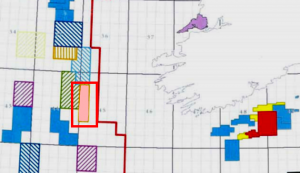
Petrel said it had purchased additional seismic data of the area and has carried out further regional seismic mapping.
“We have long believed that the offshore Porcupine Basin is a hydrocarbon province,” Petrel managing director David Horgan said in a media release.
“This has been further supported by our recent work in identifying potential prospects on both of our blocks.
“We look forward to increased activities across the Basin which we believe has the potential to be a major new oil province. We have commenced our search for potential partners.”
Shares in Petrel rose by over 10 per cent in early trading in London this morning.”
Extract from thejournal.ie
http://businessetc.thejournal.ie/oil-porcupine-basin-kerry-petrel-853171-Apr2013/
Sign Up to our Newsletter
Click Here
Posted: April 2, 2013
Extract from Independent.ie Tuesday April 2nd
By John Mulligan
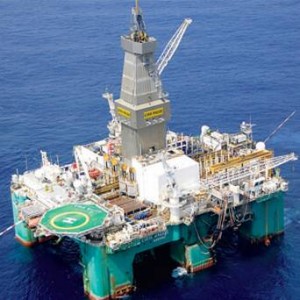
“Oil giant ExxonMobil kicks off a $160m-plus (€125m) drilling programme off the west coast of Ireland this weekend with hopes that confirmation of major fossil fuel reserves will transform the country’s economy.
The US company is planning to drill test wells over a four-month period at two prospects at the Dunquin licence area in the Porcupine Basin, 200km off shore.
Previous data has suggested that there could be over 300 million barrels of oil and 8.5 trillion cubic feet of gas between the two Dunquin prospects.
If they could be proven and then extracted, such finds would mark one of the biggest ever global discoveries of oil and gas and be a game-changer for Ireland’s economic fortunes.
Hidden
But despite the 200 or so wells drilled off Ireland’s shores in the past number of decades, only two have resulted in commercial fields – Kinsale and Corrib.
Both are minnows compared to the prospective resources that could be hidden at Dunquin. Kinsale had about 1.5 trillion cubic feet of gas, while Corrib has about one trillion.
Located at a point in the Atlantic where the ocean is 1.6km deep, ExxonMobil’s drilling programme is being eagerly watched by oil companies from abroad and Ireland, including Petrel Resources, which has an exploration block just 35km away from the Dunquin prospect.
ExxonMobil controls 27.5pc of the Dunquin prospect, with Italian firm Eni holding another 27.5pc.
Spanish energy firm Repsol owns 25pc and UK-based Sosina has a 4pc interest. Irish exploration firm Providence Resources has a 16pc interest in the prospect. A major oil or gas find could catapult its shares higher.
The Dunquin prospect – where the reserves are as deep as 3.6km under the seabed – is one of the most important exploration areas for Providence, which is headed by Tony O’Reilly Jnr.
Providence is also betting that it could have a major oil find on its hands at a site called Barryroe, which is close to the Kinsale field. The company reckons that there could be 280 million barrels of recoverable oil at the Barryroe prospect.”
http://www.independent.ie/business/irish/oil-giant-exxon-starts-160m-drilling-project-off-west-coast-29163728.html
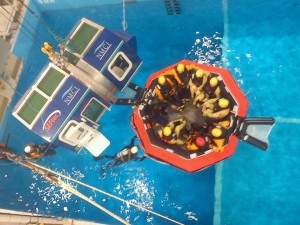
Sign Up to our Newsletter
Click Here
Posted: March 21, 2013
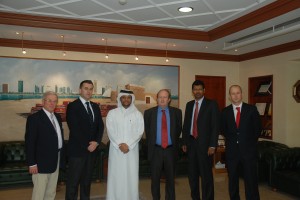 On 14 March 2013, His Excellency Sheikh Saoud bin Abdulrahman Al-Thani, Minister of Sport & Secretary General of the Qatar Olympic Committee (QOC) is pictured with Board Members of SEFtec NMCI Offshore (“SNO”), Conor Mowlds (pictured 2nd from left) and Darren O’Sullivan (pictured 4th from left). This was taken prior to the signing of a Memorandum of Understanding between SEFtec NMCI Offshore and IRM Offshore to provide support for the development of dedicated TEMPSC coxswain training facility in Qatar over the next 12 months.
On 14 March 2013, His Excellency Sheikh Saoud bin Abdulrahman Al-Thani, Minister of Sport & Secretary General of the Qatar Olympic Committee (QOC) is pictured with Board Members of SEFtec NMCI Offshore (“SNO”), Conor Mowlds (pictured 2nd from left) and Darren O’Sullivan (pictured 4th from left). This was taken prior to the signing of a Memorandum of Understanding between SEFtec NMCI Offshore and IRM Offshore to provide support for the development of dedicated TEMPSC coxswain training facility in Qatar over the next 12 months.
Sign Up to our Newsletter
Click Here
Posted: February 11, 2013
Australia’s oil and gas workers enjoyed the highest average salaries in the industry in 2012 due to a skills shortage, with expatriates pocketing $171,000 a year, a study said on Friday.
Despite uncertain global economic conditions, wages in the oil and gas industry rose globally by 8.5 percent in 2012 to $87,300, according to Hays Oil and Gas Job Search. That follows an average increase of 6.5 percent in 2011.
“There would be few industries with such a track record of growth over the last few years in what has been, in the most part, an uncertain economic environment,” the report said.
World oil production in 2012 grew by 2 percent from the previous year to 89.17 million barrels per day and is expected to increase 1 percent this year, according to the U.S. Energy Information Administration.
Expatriates in Australia topped the list, and Norway came second, according to the survey, conducted among more than 25,000 employees. Among local hires, Australians workers were also the highest earners, with an average wage of $163,600.
“At the top of this year’s table, we once again see Australia and Norway. Both countries have limited skilled labour pools and significant workloads. The result is very high pay rates, although both would appear to have met some sort of ceiling,” the report said.
Australia is preparing to become one of the world’s largest liquefied natural gas (LNG) exporters, with 190 billion Australian dollars ($196.2 billion) worth of projects currently underway, requiring a vast workforce.
The average wage in the United States was significantly lower at $123,800. At the other end of the spectrum were expatriates in Sudan, who according to the survey, earned $59,800 in 2012. Wages tumbled in Iran, whose oil and gas production contracted last year as a result of Western sanctions over its disputed nuclear programme. The average expatriate salary in Iran dropped 27 percent in 2012 to $68,100, while the average for local employees fell 10 percent to $46,900, the study found. “Where imported salaries are concerned, it is once again the frontiers of the industry that are pushing the upper limits of pay. Representing a mix of danger money and hardship allowance in these base salaries, we find Russia’s Arctic exploration driving imported skills, and China’s drive on non-conventional skills also pulling in experts on premium rates,” Hays Oil and Gas Job Search said. The risks involved in some exploration and production regions were laid bare last month in Algeria, where Islamist gunmen attacked a gas plant, which led to the deaths of at least 38 local and foreign workers. Expatriate salaries in Algeria averaged $92,400 last year, according to the survey, which was conducted before the attack. As for areas of expertise, vice presidents and directors of subsea pipeline projects earned the highest average wages at $251,200, up 9 percent from 2011. Graduate salaries increased 12 percent to just under $40,000 in 2012. In an industry counting around 5 million people across the world, 47.4 percent are expatriates, with the remainder employed locally, the report said. ( C) Reuters
For more information and news please see http://www.fxcentre.com/news.asp?3033334
Sign Up to our Newsletter
Click Here








Connect with NMCIS